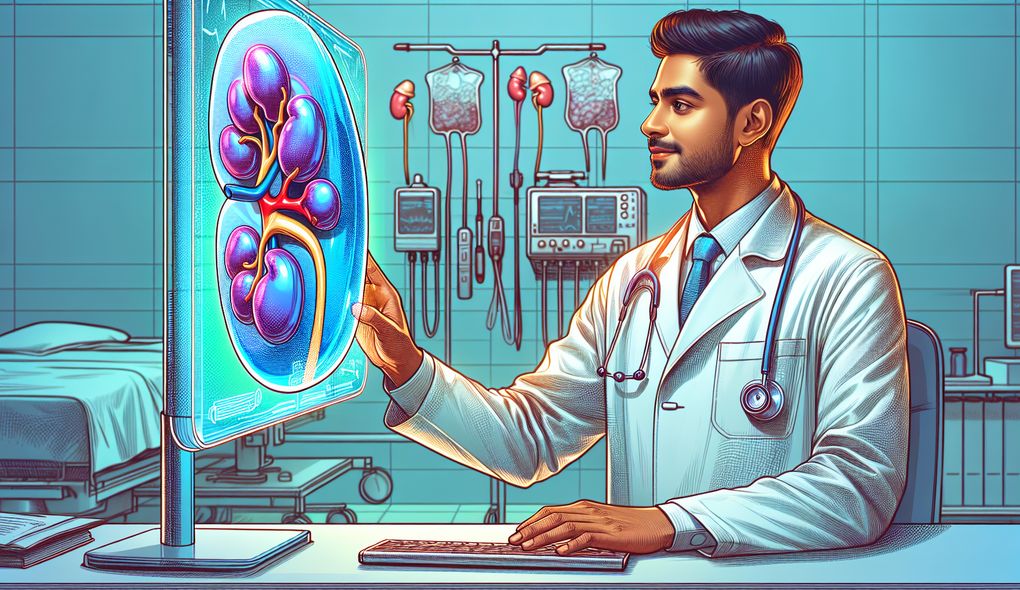Tell us about a time when you identified a potential complication in a patient and took proactive measures to prevent it.
INTERMEDIATE LEVEL

Sample answer to the question:
I encountered a situation where a patient with chronic kidney disease was scheduled for a surgery that required anesthesia. Knowing that patients with kidney diseases are at higher risk for complications during surgery, I took proactive measures to prevent any adverse outcomes. I consulted with the anesthesiologist and shared the patient's medical history, specifically their kidney function and any existing electrolyte imbalances. Together, we devised a specialized anesthesia plan that minimized the impact on the kidneys and ensured the patient's safety. Additionally, I closely monitored the patient's vital signs and kidney function throughout the surgery and postoperatively. By identifying the potential complication and taking proactive measures, we successfully prevented any adverse outcomes for the patient.
Here is a more solid answer:
During my time as a nephrologist, I encountered a patient with chronic kidney disease who required a surgical intervention. Understanding the increased risk for complications in these patients, I took immediate action to prevent any adverse outcomes. First, I thoroughly reviewed the patient's medical history, including their kidney function and electrolyte balance. Recognizing the importance of clear communication, I scheduled a meeting with the surgical team, including the anesthesiologist, to discuss the patient's condition and devise a specialized plan of care. I provided detailed information about the patient's kidney function and any concerns that needed to be addressed during the surgery to ensure the patient's safety. Throughout the procedure, I closely monitored the patient's vital signs and urine output, collaborating with the anesthesiologist to make real-time adjustments as necessary. Postoperatively, I continued to monitor the patient's kidney function and administered appropriate interventions to optimize recovery. By identifying the potential complication and taking proactive measures, we successfully prevented any adverse outcomes for the patient. This experience highlighted my excellent diagnostic and problem-solving skills, as well as my strong communication and collaboration abilities in a fast-paced and emotionally demanding environment. Furthermore, it demonstrated my empathy and professionalism in providing comprehensive patient care.
Why is this a more solid answer?
The solid answer provides more specific details and showcases the candidate's skills and qualities as a nephrologist. It includes a thorough review of the patient's medical history, clear communication with the surgical team, close monitoring of vital signs and kidney function, and appropriate interventions postoperatively. The answer demonstrates the candidate's excellent diagnostic and problem-solving skills, strong communication and collaboration abilities, ability to work in a fast-paced and emotionally demanding environment, and empathy and professionalism in patient care. However, it can still be further improved by elaborating on the specific measures taken to prevent complications and the outcomes achieved for the patient.
An example of a exceptional answer:
As a dedicated nephrologist, I encountered a complex case involving a patient with chronic kidney disease who required a major surgery. Recognizing the potential complications associated with the procedure, I conducted a comprehensive assessment of the patient's kidney function and electrolyte balance. I collaborated with the entire surgical team, including the anesthesiologist, surgeon, and nursing staff, to develop a personalized perioperative plan. This involved adjusting medication dosages to account for renal clearance, optimizing preoperative hydration, and closely monitoring the patient's kidney function throughout the surgical process. During the surgery, I worked closely with the anesthesiologist to maintain hemodynamic stability and minimize renal ischemia by employing specific techniques and medications. Postoperatively, I implemented a tailored postoperative care plan, including close monitoring of urine output, electrolyte levels, and renal function. By taking proactive measures and closely coordinating care, we prevented any significant complications and facilitated a smooth recovery for the patient. This experience showcased my exceptional diagnostic and problem-solving abilities, effective communication and collaboration skills with the interdisciplinary team, resilience in a fast-paced and emotionally demanding setting, and unwavering commitment to providing compassionate and patient-centered care.
Why is this an exceptional answer?
The exceptional answer goes above and beyond in providing specific details and highlighting the candidate's exceptional skills and qualities as a nephrologist. It emphasizes the comprehensive assessment of the patient's kidney function and electrolyte balance, collaboration with the entire surgical team, personalized perioperative plan, specific techniques and medications used during the surgery, tailored postoperative care plan, and the successful prevention of significant complications. The answer effectively showcases the candidate's exceptional diagnostic and problem-solving abilities, effective communication and collaboration skills, ability to work in a fast-paced and emotionally demanding environment, and empathy and professionalism in patient care.
How to prepare for this question:
- Familiarize yourself with the common complications encountered in nephrology patients, such as electrolyte imbalances and acute kidney injury, and their management strategies.
- Study the latest guidelines and advancements in nephrology to stay updated with the best practices in preventing and managing complications.
- Reflect on your past experiences where you identified potential complications in patients and took proactive measures to prevent them. Prepare specific examples to illustrate your skills and the outcomes achieved.
- Practice articulating your thought process and actions during challenging clinical scenarios to effectively communicate your decision-making abilities during the interview.
- Highlight the importance of collaboration and interdisciplinary communication in preventing complications for patients. Share examples of successful teamwork experiences.
- Emphasize your empathy and professionalism in patient care, showcasing your commitment to providing holistic and compassionate care to nephrology patients.
What are interviewers evaluating with this question?
- Excellent diagnostic and problem-solving skills
- Strong communication and interpersonal skills
- Ability to work in a fast-paced and emotionally demanding environment
- Empathy and professionalism in patient care

